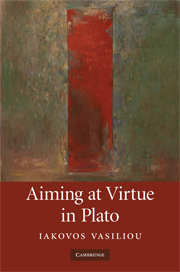Book contents
- Frontmatter
- Contents
- Acknowledgements
- Introduction
- Chapter 1 Socrates and the supremacy of virtue
- Chapter 2 Determining virtue in the here and now: Socrates in the Apology and Crito
- Chapter 3 The supremacy of virtue in the Gorgias
- Chapter 4 Trying (and failing) to determine what virtue is
- Chapter 5 Socrates and Thrasymachus: Republic 1
- Chapter 6 The benefits of injustice
- Chapter 7 Early education and non-philosophers in the Republic
- Chapter 8 Aiming at virtue and determining what it is
- Chapter 9 Epilogue
- Bibliography
- Index locorum
- General index
Introduction
Published online by Cambridge University Press: 22 September 2009
- Frontmatter
- Contents
- Acknowledgements
- Introduction
- Chapter 1 Socrates and the supremacy of virtue
- Chapter 2 Determining virtue in the here and now: Socrates in the Apology and Crito
- Chapter 3 The supremacy of virtue in the Gorgias
- Chapter 4 Trying (and failing) to determine what virtue is
- Chapter 5 Socrates and Thrasymachus: Republic 1
- Chapter 6 The benefits of injustice
- Chapter 7 Early education and non-philosophers in the Republic
- Chapter 8 Aiming at virtue and determining what it is
- Chapter 9 Epilogue
- Bibliography
- Index locorum
- General index
Summary
AIMING AND DETERMINING
In the Cleitophon, a short and strange dialogue attributed to Plato, the character “Socrates” speaks only twice. He accuses the eponymous interlocutor on the one hand of telling people that it is a waste of time to associate with him, while on the other of lauding contact with Thrasymachus, the infamous character from Book 1 of Plato's Republic. Cleitophon replies that Socrates has not heard the whole story: he is in certain respects deeply impressed by Socrates, but in other ways sharply critical. Always open to correction and betterment, Socrates is happy to hear Cleitophon's complaints and the last four Stephanus pages of the work consist solely of a speech by Cleitophon in which he sharply distinguishes between two tasks: (1) persuading a person that virtue is more important than anything else; and (2) saying precisely what virtue is. According to Cleitophon, Socrates does an excellent job, better than any other person, at persuading and exhorting people to pursue virtue and the care of their souls (407a7, 410b4–6), but he is utterly unhelpful when it comes to saying what virtue actually is. Because Socrates is so useless with this substantive question, Cleitophon is forced to conclude that either Socrates' ability to champion virtue does not in any way imply that he knows what virtue is, or else Socrates is simply unwilling to tell him. It is Socrates' failure on this second issue that leads Cleitophon to turn to Thrasymachus (410c–d).
- Type
- Chapter
- Information
- Aiming at Virtue in Plato , pp. 1 - 21Publisher: Cambridge University PressPrint publication year: 2008



